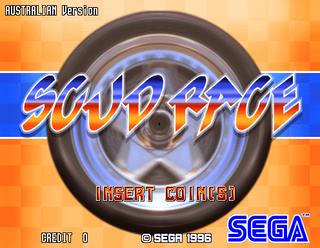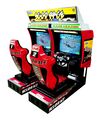Difference between revisions of "Scud Race"
From Sega Retro
| Line 33: | Line 33: | ||
''Scud Race'' was due to be ported to the [[Sega Saturn]] before development moved over to the [[Sega Dreamcast]]. The Dreamcast version of the game was used in a tech demo in the [[1998 Dreamcast Presentation]], but the port was cancelled for unknown reasons. Some Dreamcast development kits have sections of Scud Race built in for example purposes. ''Scud Race'' was likely intended to show off the capabilities of the Model 3 hardware as it contains many bright, colourful and detailed stages all played through at fast speeds while retaining the 60FPS refresh rate. | ''Scud Race'' was due to be ported to the [[Sega Saturn]] before development moved over to the [[Sega Dreamcast]]. The Dreamcast version of the game was used in a tech demo in the [[1998 Dreamcast Presentation]], but the port was cancelled for unknown reasons. Some Dreamcast development kits have sections of Scud Race built in for example purposes. ''Scud Race'' was likely intended to show off the capabilities of the Model 3 hardware as it contains many bright, colourful and detailed stages all played through at fast speeds while retaining the 60FPS refresh rate. | ||
| − | Despite seeing no console release of its own, the four tracks in ''Scud Race'' appear in the [[Xbox]] port of ''[[OutRun 2]]''. | + | Despite seeing no console release of its own, the four tracks in ''Scud Race'' appear in the [[Xbox]] port of ''[[OutRun 2]]'', complete with original music. [[Scud Race Sound Tracks|The official soundtrack]] was released in Japan, as was an updated version of the game, ''[[Scud Race Plus]]''. |
==Cars== | ==Cars== | ||
Revision as of 10:28, 8 September 2011
| Scud Race |
|---|
| System(s): Sega Model 3 Step 1.5 |
| Publisher: Sega |
| Developer: Sega AM2 |
| Genre: Racing |
| Number of players: 1-4 |
Scud Race, known as Sega Super GT in North America, is a racing game developed for Sega Model 3 Step 1.5 hardware in late 1996. The first Model 3 racing game, Scud Race is a spiritual sequel to Daytona USA with very similar controls, HUD and visual style, though features supercars rather than stock cars. The working title of this game was simply Supercar, though European flyers suggest that at one point the Scud Race name wasn't deemed final either. "Scud" stands for "Sport Car Ultimate Drive".
Like Daytona USA, Scud Race was based on a real life racing event - the BPR Global GT Series, being sponsored by the BPR Organization. It also features four real-life cars - the Porsche 911 GT2, the Ferrari F40 GTE, the Dodge Viper GTS-R and the McLaren F1 GTR. Renault Alpine GTA/A610s are also featured, but are driven by the computer and cannot be selected by the player.
Scud Race was due to be ported to the Sega Saturn before development moved over to the Sega Dreamcast. The Dreamcast version of the game was used in a tech demo in the 1998 Dreamcast Presentation, but the port was cancelled for unknown reasons. Some Dreamcast development kits have sections of Scud Race built in for example purposes. Scud Race was likely intended to show off the capabilities of the Model 3 hardware as it contains many bright, colourful and detailed stages all played through at fast speeds while retaining the 60FPS refresh rate.
Despite seeing no console release of its own, the four tracks in Scud Race appear in the Xbox port of OutRun 2, complete with original music. The official soundtrack was released in Japan, as was an updated version of the game, Scud Race Plus.
Cars
Tracks
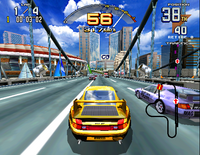 |
Beginner (Day), also known as Dolphin Tunnel, is the easiest of the four tracks in Scud Race, and the most iconic. It is a simple track which takes place across a modern city. Much of this track actually takes place underwater - there is a pair of tunnels with glass frames (collectively known as "Dolphin Tunnel") which travel beneath a river.
There is also a tower preceeding a bridge with a rotating Sega Saturn logo, as well as a poster showing Sonic the Hedgehog and Miles "Tails" Prower driving what seems to be a Ferrari. |
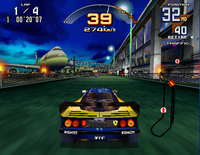 |
Beginner (Night), also known as Twilight Airport, is also an easy track. This one takes place around an airport. The two beginner stages have rolling starts, similar to Daytona USA. |
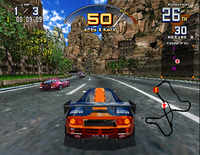 |
Medium, also known as Mystery Ruins, is a more challenging track which requires more use of the drift mechanic. It is set in an Aztec ruin-esque mountainous region with several foggy segments. There are only 30 racers on this track by default and there are only three laps. |
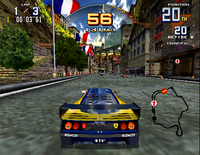 |
Expert, also known as Classic Castle, is the hardest track in the game and has a European setting. From the French flags it can be deduced that the initial part of the stage takes place in France, but by the end the player travels through a bull fighting arena, which implies the course takes place in Spain. Similar to OutRun, Scud Race is not aiming to be extremely realistic.
Only 20 racers are on this track at any given time, with three laps given to try and overtake them all. |
Production Credits
Producer: Toshihiro Nagoshi
Programmers: Takuji Masuda (program director), Kouki Koiwa, Takashi Fujimura, Kazuhiko Takata, Takashi Isowaki, Takayuki Kazama, Ryo Ikawa
Designers: Yasuo Kawagoshi (design director), Daisuke Sato, Akihito Hiroyoshi, Junichi Yamanaka, Yukinobu Arikawa, Makio, Kazufumi Ohashi, Hidenobu Miyakita, Junichi Yamada, Makoto Osaki, Kazuhiro Izaki, Naotake Nishimura, Shinichiro Shimano
Sound: Hideaki Miyamoto, Tohru Nakabayashi, Fumio Ito, Hidenori Shoji
- Digital Media Studio: Tatsutoshi Narita, Naoyuki Machida
- YUMEX: Junji Fujita, Kaoru Ohori, Hiroko Hamano
Cabinet Engineers: Masao Yoshimoto (mechanical engineering), Eiji Nishimura, Eiji Inoue, Yumiko Ara, Hiroyuki Takahashi, Hideyuki Yamada, Mikio Tsuda, Keisuke Tsukahara
Publicity: Koji Umeda
Special Thanks: BPR Organization, JAL, CG, S.S. Company ltd., Cobra Company Japan, Yu Suzuki
Presented by: Sega
Gallery
Physical Scans
Template:ScanflyerTemplate:ScanflyerTemplate:ScanflyerTemplate:ScanflyerTemplate:ScanflyerTemplate:ScanflyerTemplate:Scanflyer
